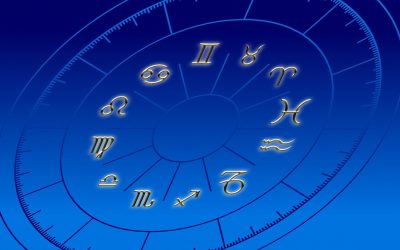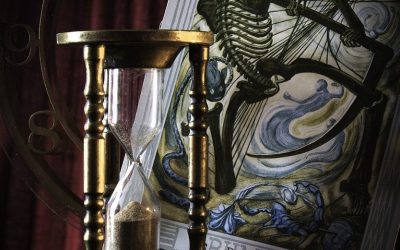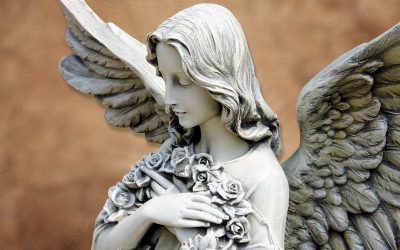A comparative study of Crowley’s Liber AL, or The Book of the Law, and his Book of Thoth is an interesting area to study. Those teachers of Tarot who are wedded inseparably to the Rider-Waite persuasion love to put the fear of God into students about Thoth (isn’t it amazing that the compliment is not reciprocated – what could be fearful about Waite’s oeuvre, except for hysterical mass dumbing down and obsession with meanings?). The point of these essays (no idea how many at the moment – no idea where this one is going either), is not to be an apologist, or even an evangelist for Liber AL. Believe me, in the early dark days I was convinced that Thoth was indeed Thelemic – Crowley quotes liberally, and sometimes in huge chunks from it, but in the end I had to admit defeat. Thoth is not Thelemic. That does not mean that Thoth does not have Thelemic overtones. Crowley was never going to limit himself, for he knew that of all his literary output Thoth has the potential to reach a far greater audience, and so it has proved.
Holy Books
There are those for whom Liber AL is Holy, and they approach it with religious fervour – some have made it the Holy of their own brand of Thelemic religion. If you cannot tell, again I have to insist that I am not one of them. If you were to push me the Bible, the Quran, the Bhagavad Gita and others have more merit.
The subject of “Do what thou wilt” bores the pants off me (I am English, so I am referring to the item of clothing worn under the trousers). Years of doing readings for all and sundry has taught me that nobody does anything they don’t want to do, and if they do, they dress it up or prove it as an action for someone else. What “Do what thou wilt” does score highly, and for which I heartily approve, is the trashing and kicking it gives to all notions of karma and fatalism.
I have no truck with fatalist readers and psychics who either indulge clients in the game of “What will happen in the future?”. As we all know, shit happens. This passive approach drives me nuts. We all have dominion over our lives, we all generate our own future, and we are destined to make the mistakes of the past (Karma, bad luck, past lives etc), only if we are stupid enough to choose that path. What we Wilt is up to us, its our burden, its time we bucked the trend and stood up for who we are, with dignity and integrity. A good tarot reader will ease that process of choice by demonstrating that there are an infinite number of futures not yet mapped out, and by living in the present (where else can we be?), we generate possibilities. The reader can than suggest various directions to take.
Do What Thou Wilt
“Do what thou wilt” will never work within the narrow confines of the Celtic Cross spread. How many Thelemites, I wonder, still pursue that avenue? If this sounds like a rant, it probably is, and it is possible for a Tarot reader to work with Thoth, and have no interest at all in the Book of Law, and use the Celtic Cross spread. Now that is a waste, but choice is paramount in all things.
Back to Thelema, and for many years it has struck me how lukewarm the Thelemite attitude is to Thoth. They protest when I mention it, but they do have a real talent for making the most amazing and most fascinating and challenging book on the tarot sound like a telephone directory read by Marvin the Paranoid Android. Is there a conspiracy pact between Thelemites and apologists for the Rider-Waite to marginalise and dumb down Crowley’s last great creation? I think we should be told. I guess Thelemites are in agreement with me – the Book of Thoth is not Thelemite; otherwise Crowley would not quote chunks of Liber AL. Therein lies the problem for them. It isn’t for me, because I am not wedded to the concept, and it is entirely liberating and enjoyable when reading Crowley’s writings without having to live or believe the religious overtones.
Fortunately for me, I have no party line, and nothing to lose from a Thelemite Lodge because I am not a member, and aren’t I doing what I wilt anyway? I don’t know what my views on the Book of Law are, so it will be interesting to see if I, and you the reader, can come to a conclusion on the matter.
Let us consider the numeration of Liber AL, which is confusing to say the least. AL=31, but it is usually numbered as 220. The 31st Path is conveniently Judgment, which was renamed Aeon by Crowley, and he states that the depiction of this card should include the Stele of Revealing, which inspired Rose Kelly when she saw it to tell her new husband (they were on their honeymoon) that a message was coming, which became the Liber AL. As any student of the Thoth knows, Crowley omitted (instructed Frieda Harris?) the Stele of Revealing from the design. Frieda Harris produced many versions, so are there extant versions of the Aeon hidden away with the Stele on it?
Tzaddi is not the Star
The other area where Crowley endeavoured Thoth to conform with the Liber AL is in the statement “Tzaddi is not the Star”. If that is true, then one other Major Arcana is incorrectly attributed. Crowley eventually plumped for the Emperor, but he was never entirely convinced, nor did he come up with a convincing argument. He could have saved a lot of angst by simply stating that in Gematria the Hebrew words for Aries and Aquarius are exactly same, and possibly a memory of that fact got projected into Kelly when she was receiving. At any rate, Crowley botched the transposition of the two cards, creating an unholy mess.
In conclusion, Crowley failed miserably in trying to make the Book of Thoth conform to the Book of the Law, and if he had succeeded, it would have made the Tarot less convincing. This is especially true by contrast in his writings in the Book of Thoth where he has no doubts about what he was trying to do. The debate on how many students of the Book of Thoth really understand it (I include the experts on Thelema in this), is short-lived – nobody really understands it, which is why it is a classic, and why I learn something new every time. Contrast this to the doubts in Crowley’s mind about the message of Liber AL, which he never resolved, and the number of commentaries he wrote on it, with varying degrees of satisfaction.





I find your writings very educational and I do or will keep an ” open mind”. I, too, have been in contact with spiritss when young and have seen a spirit when working at a funeral home as a first call driver. Again, I’m enjoying your read as well learning.